Are you looking for a cost-effective solution for your database management needs? Look no further than cloud-based database software! With the rise of cloud computing, more and more businesses are turning to the cloud for their data storage and management needs.
In this blog post, we’ll explore the benefits of using cloud database software and some of the most cost-effective options available on the market today. Whether you’re a small startup or a large enterprise, a cloud database solution can meet your needs and budget. So, let’s dive in and discover the power of cloud-based database software!
What Is Database Software?
Database software is a computer program designed to help businesses organize, store, and manage large amounts of data. It allows users to create, update, and retrieve data from a database in an efficient and organized manner. Database software is essential for businesses that need to store and manage customer information, inventory data, financial records, and more. It comes in a variety of forms, from simple desktop applications to complex enterprise-level systems. With the rise of cloud computing, many businesses are now turning to cloud-based database software for its scalability, affordability, and ease of use.
What is a Database Management System (DBMS)?
A database management system (DBMS) is a software system that allows businesses to manage and manipulate their databases. It provides a way for users to create, modify, and organize data, as well as perform advanced queries and analyses. DBMSs can handle various types of data, from simple text files to complex multimedia files, making them essential for businesses of all sizes. With the help of a DBMS, businesses can ensure their data’s accuracy, consistency, and security while also improving efficiency and productivity.
No matter whether you’re running a small business or a large corporation, a DBMS can help you gain valuable insights from your data, and make informed decisions that drive growth and success. So, if you’re looking to take your business to the next level, consider investing in a powerful and reliable database management system today.
Why it is Necessary to Use a DBMS (Database Management System)?
There are numerous benefits to using a database management system (DBMS) for your business. Here are the top 5 reasons why a DBMS is essential:
- Improved Data Quality: A DBMS ensures data accuracy and consistency, reducing the risk of errors or discrepancies in your data.
- Enhanced Security: DBMSs provide robust security features to safeguard your data against unauthorized access or cyber threats.
- Increased Productivity: With a DBMS, you can streamline data management processes, saving time and resources, and improving overall productivity.
- Advanced Querying and Reporting: DBMS allows you to perform complex queries and generate reports quickly and easily, enabling better decision-making.
- Scalability and Flexibility: As your business grows, a DBMS can accommodate increasing amounts of data, ensuring that your system remains efficient and effective over time.
By using a DBMS, businesses can gain a competitive advantage, make better decisions, and achieve their goals more effectively. Whether you’re looking to improve data quality, enhance security, or boost productivity, a DBMS is a powerful tool that can help you achieve your objectives.
How To Choose The Best Cost-effective Cloud Database Software for Your Business?
Choosing the best cost-effective cloud database software for your business can be a daunting task. To help you make an informed decision, consider the following factors:
- Data Volume: Determine how much data you need to store and manage, and choose a cloud database solution that can accommodate your needs.
- Performance: Consider the speed and reliability of the database software, and choose a solution that can handle your workload.
- Scalability: Look for a cloud database solution that can scale up or down as your business needs change.
- Security: Choose a solution that offers robust security features to protect your data from unauthorized access or cyber threats.
- Cost: Evaluate the cost of different cloud database solutions, including any hidden fees or long-term costs.
- Integration: Consider how well the database software integrates with your existing systems and applications.
- Support: Choose a cloud database solution that offers reliable customer support and assistance.
By considering these factors, you can choose the best cost-effective cloud database software for your business. Whether you’re a small business or a large enterprise, a cloud database solution can meet your needs and budget. So, research your options and find the best cloud database solution that can help you succeed in a competitive market.
Top 10 Cost-effective Database Software
When it comes to choosing cost-effective database software, there are numerous options available on the market. Here are the top 10 cost-effective database software solutions to consider:
MySQL
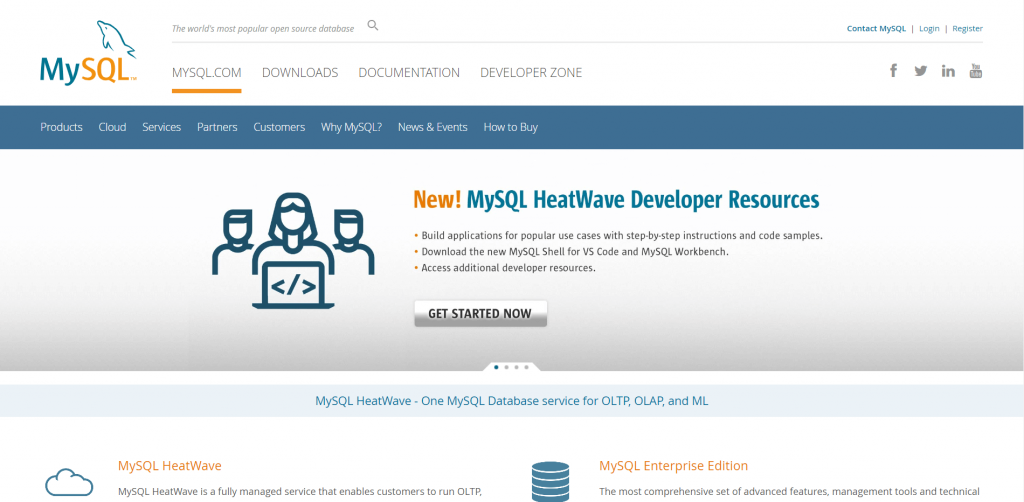
MySQL is a popular open-source relational database management system (RDBMS) that has gained popularity for its speed, reliability, and ease of use. It is widely used for web applications and other data-driven projects due to its scalability and ability to handle large amounts of data efficiently. MySQL uses Structured Query Language (SQL) for managing and manipulating data, which makes it easy to learn for developers with SQL experience.
One of the main advantages of MySQL is its flexibility. It can be used for a wide variety of applications, including e-commerce sites, content management systems, and social networks. It is also compatible with many programming languages, including PHP, Python, and Java. MySQL is open-source software, which means it is free to use and can be modified and distributed by anyone. This has helped to make it one of the most widely used database systems in the world, as developers and organizations can customize it to meet their specific needs.
In addition, MySQL offers features such as transactional processing, stored procedures, and triggers, which make it a powerful tool for managing complex data structures. It also offers robust security features, including support for encryption and secure connections, to help keep data safe. Overall, MySQL is a cost-effective and powerful database management system for your business, MySQL is definitely worth considering.
PostgreSQL

PostgreSQL is a powerful and open-source relational database management system (RDBMS) that is known for its reliability, scalability, and extensive feature set. It is commonly used in large-scale applications where high levels of data integrity and performance are required. PostgreSQL is a popular choice for businesses and developers because it is free to use, customizable, and offers many advanced features.
One of the main advantages of PostgreSQL is its ability to handle complex queries and data structures. It supports advanced features such as nested transactions, sub-selects, and stored procedures, which make it a powerful tool for managing complex data. PostgreSQL also offers built-in support for various data types, including JSON and XML, making it easy to work with a variety of data formats. Another advantage of PostgreSQL is its scalability. It can handle large amounts of data and high traffic volumes without sacrificing performance. This makes it a popular choice for businesses and organizations that need to manage large amounts of data.
PostgreSQL also offers robust security features, including encryption, access controls, and auditing tools. This helps to keep data safe and secure, and ensures compliance with data protection regulations. Overall, PostgreSQL is a powerful and flexible database management system, PostgreSQL is definitely worth considering.
MongoDb
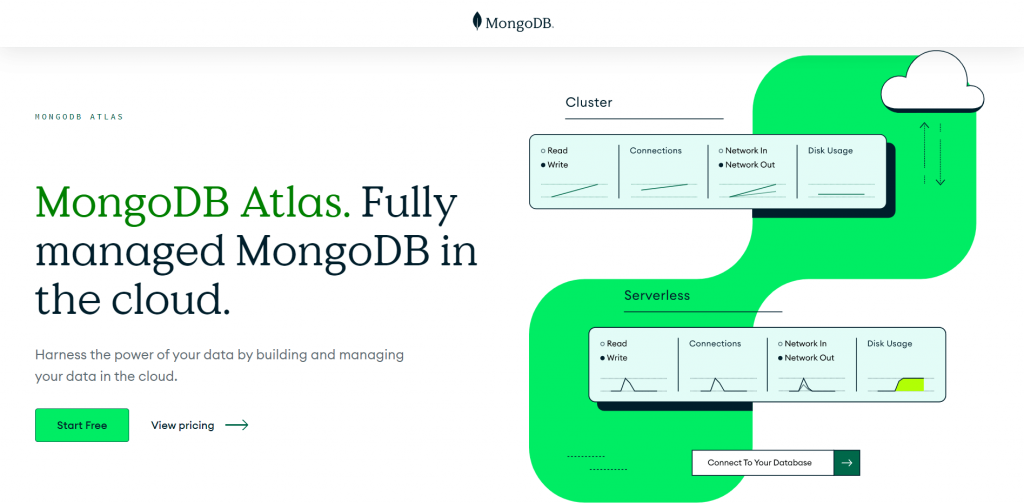
MongoDB is a popular NoSQL document-oriented database management system that is highly scalable and flexible. It stores data in JSON-like documents and can handle a variety of data types, making it a popular choice for businesses with diverse data needs. MongoDB is designed to be distributed across multiple servers, allowing for easy scalability to handle large amounts of data and high traffic volumes.
It offers a user-friendly interface and many tools and resources for easy integration with different applications and platforms. MongoDB also offers robust security features, including encryption, access controls, and auditing tools, ensuring that data is kept safe and secure. With its ease of use, scalability, and robust security, MongoDB is a great choice for businesses of all sizes, from small startups to large enterprise systems.
IBM Db2
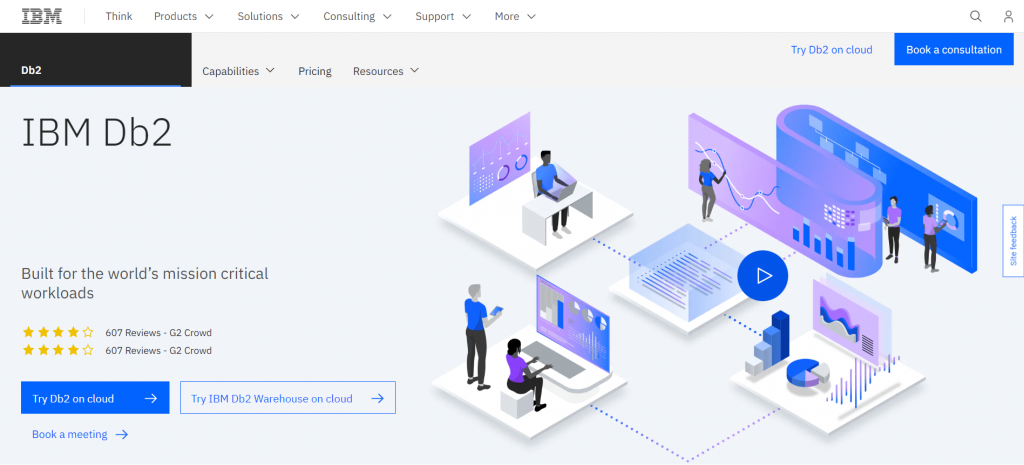
IBM Db2 is a relational database management system that is designed for enterprise-level businesses. It is a highly secure, scalable, and reliable database management system that offers a range of advanced features and tools. One of the main advantages of IBM Db2 is its ability to handle large amounts of data and high traffic volumes, making it ideal for large-scale enterprise systems.
It also offers a wide range of advanced features, such as built-in analytics, machine learning capabilities, and AI-powered automation tools. Making it a powerful tool for data analysis and management. IBM Db2 also offers advanced security features, including encryption, access controls, and auditing tools, ensuring that data is kept secure.
Additionally, it is easy to integrate with different platforms and applications and provides excellent support for various programming languages. Overall, IBM Db2 is a robust and powerful database management system that is ideal for enterprise-level businesses that require advanced features and tools for their data management needs.
MariaDB
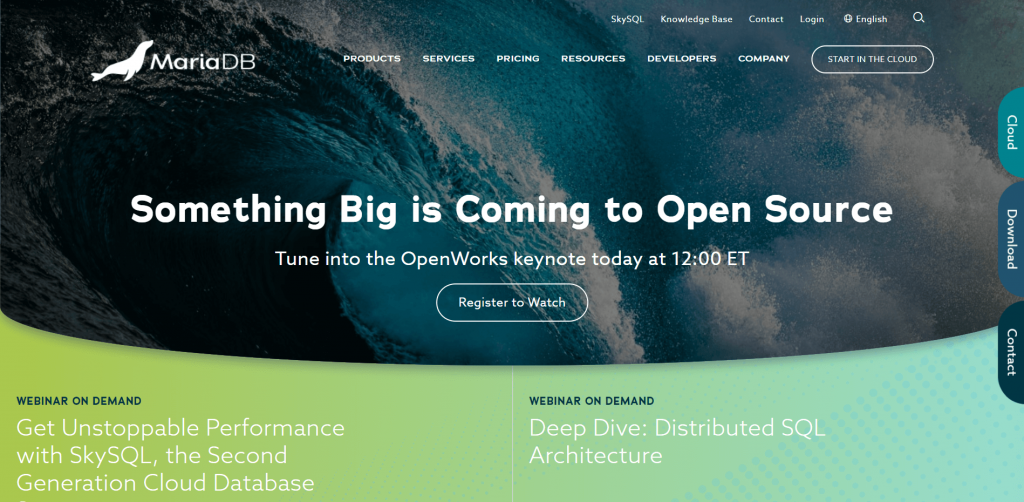
MariaDB is an open-source relational database management system that is a fork of MySQL. It offers many of the same features as MySQL, but also includes additional functionality and performance enhancements. One of the key advantages of MariaDB is its high-performance capabilities, which make it an ideal choice for applications that require fast and efficient data processing.
It also offers a range of advanced features, such as built-in analytics, replication, and clustering, making it a powerful tool for data management and analysis. MariaDB is highly scalable and can handle large amounts of data, making it ideal for businesses of all sizes. It also offers robust security features, including encryption, access controls, and auditing tools, ensuring that data is kept safe and secure.
Additionally, it is easy to use and provides excellent support for various programming languages. Overall, MariaDB is a powerful and reliable database management system that is a great choice for businesses that require high-performance capabilities and advanced features for their data management needs.
SQLite
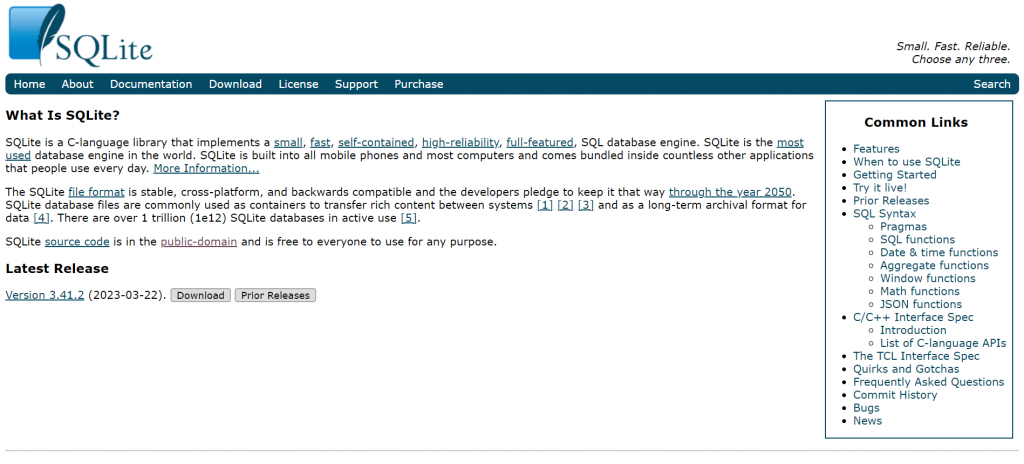
SQLite is a free, open-source, high-performance, self-contained, serverless, relational database management system (RDBMS) widely used in embedded systems, mobile applications, and desktop software. It is designed to be lightweight and fast, with a small memory footprint, making it ideal for resource-constrained devices and applications. SQLite has several key advantages over other database management systems, including its simplicity, portability, and reliability. It is a single file that can be easily copied or moved and doesn’t require any installation or configuration.
Additionally, SQLite supports ACID transactions, which ensure data integrity and consistency, and it has a powerful SQL engine that supports a wide range of SQL features, including triggers, views, and virtual tables. Another key advantage of SQLite is its compatibility with a variety of programming languages, including C, C++, Java, Python, and Ruby.
This makes it easy to integrate SQLite into existing applications and to develop new applications that require a lightweight and portable database management system. Overall, SQLite is a versatile and reliable database management system that is well-suited for small to medium-sized applications and embedded systems.
Redis
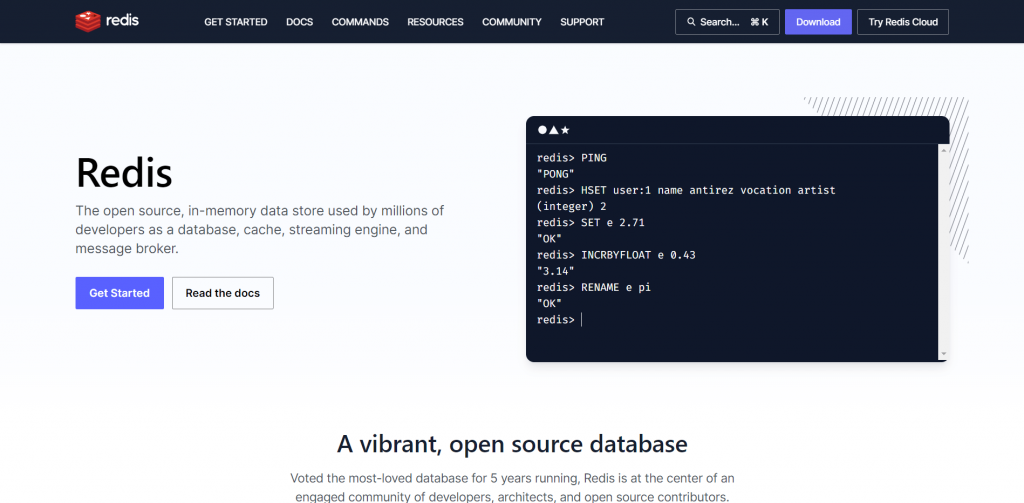
Redis is another popular open-source, in-memory data structure store that is used as a database, cache, and message broker. It is designed to be fast, efficient, and scalable, making it ideal for use in high-performance applications and real-time systems. Redis supports a wide range of data structures, including strings, hashes, lists, sets, and sorted sets, and it provides a variety of features for data manipulation, such as atomic operations and transactions.
One of the key advantages of Redis is its ability to persist data to disk, which ensures data durability and enables Redis to be used as a primary database. Redis also supports replication and clustering, which allows it to scale horizontally to handle large data sets and high volumes of requests.
Redis also has a powerful pub/sub system that lets clients and servers communicate with each other in real-time. This makes it perfect for building chat applications and other real-time systems. Overall, Redis is a flexible database program for a wide range of tasks, such as caching, sending, and storing data.
Firebird SQL
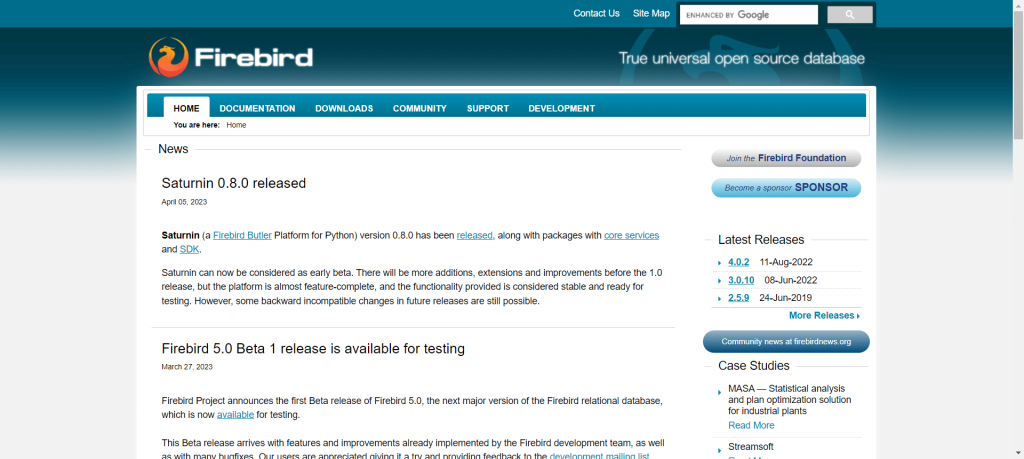
Firebird SQL is an open-source, relational database management system that offers high performance, scalability, and robustness. It is widely used in production environments and is known for its low maintenance costs and ease of use. Firebird SQL supports a range of SQL standards and features, including triggers, stored procedures, and views, and it offers full ACID compliance to ensure data consistency and durability. One of the key advantages of Firebird SQL is its ability to handle large volumes of data and high levels of concurrent user activity, making it ideal for use in mission-critical applications.
Also, Firebird SQL is very easy to change. There are a lot of extensions and add-ons that developers can use to make the database fit their needs. It also works on different systems, such as Windows, Linux, and macOS, making it a good choice for organizations with diverse IT environments. Overall, Firebird SQL is a powerful and reliable database software that can help businesses of all kinds in many ways.
Microsoft Azure
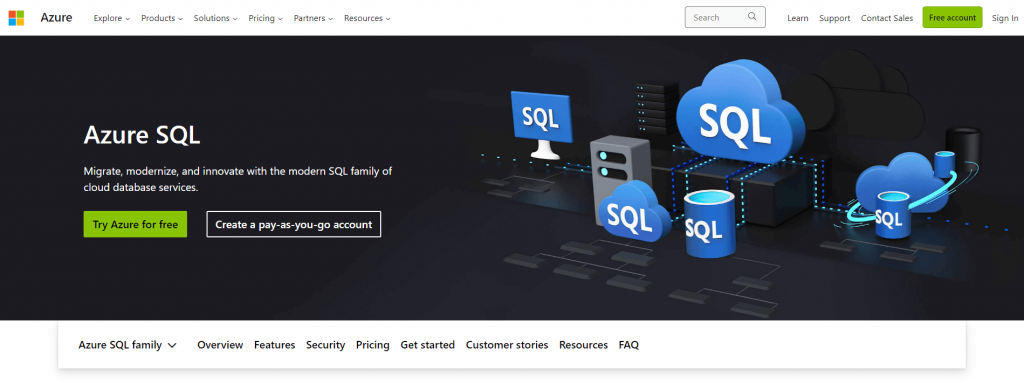
Microsoft Azure is a cloud-based database management system designed to provide a scalable and secure solution for storing and managing data. With its fully managed platform, users can deploy and manage SQL and NoSQL databases with ease. One of the key features of Azure is its ability to provide high availability and disaster recovery capabilities. This ensures that users’ data is always available, even in the event of a disaster. Azure also offers built-in security features like data encryption, threat detection, and access controls to ensure the protection of sensitive information.
Another advantage of Azure is its flexibility in terms of deployment options. Users can choose to deploy databases on-premises, in the cloud, or in a hybrid environment, depending on their specific needs. Azure also integrates seamlessly with other Microsoft products, allowing for easy collaboration and data sharing.
Additionally, Azure provides users with real-time analytics capabilities and powerful AI tools, allowing for advanced data processing and insights. Its pricing model is also flexible, with options for pay-as-you-go or reserved instance pricing. This makes Microsoft Azure a comprehensive and reliable cloud-based database management system with a range of features and advantages for businesses of all sizes.
CouchDB
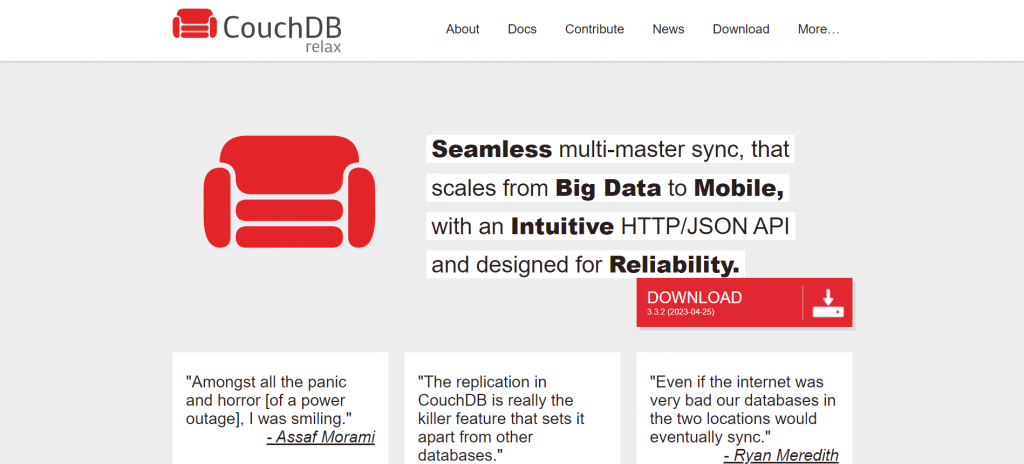
CouchDB is an open-source NoSQL document-oriented database management system that stores data in JSON-like documents. It is designed to work seamlessly with web-based applications, allowing data to be stored, queried, and retrieved in real-time. CouchDB has gained popularity due to its ability to work with web applications and to provide easy scalability and high availability.
CouchDB’s ability to sync data across multiple devices and servers is one of its best features. It is an ideal choice for applications that need to work offline or have multiple users assessing the same data. It also has a flexible data model, which makes it easy to change the schema, and it supports MapReduce queries, which make it fast and easy to ask questions about big datasets.
CouchDB also offers a RESTful API, making it easy to integrate with web applications and other systems. It is also highly scalable, allowing for horizontal scaling by adding additional servers to handle increasing workloads. CouchDB’s built-in replication feature enables automatic synchronization of data between servers, ensuring that data is always up-to-date and available.
In summary, CouchDB is a powerful, open-source NoSQL database management system that offers flexibility, scalability, and high availability. Its ability to work with web applications and synchronize data across multiple devices and servers makes it an attractive option for modern, web-based applications.
Conclusion – Cost-effective Cloud Database Software
Choosing the right cloud database software is crucial for any business, as it can impact their overall efficiency and productivity. It’s important to consider the features and benefits of each option, as well as their pricing models, scalability, and security features. By doing so, businesses can find cost-effective cloud database software that meets their unique needs and helps them achieve their goals.
From popular options like MySQL and PostgreSQL to newer solutions like CouchDB and Redis, there is a range of cloud database software available on the market. With the right choice, businesses can unlock the benefits of cloud computing and streamline their data management processes. So, take the time to explore the options and find the right solution for your business’s database needs.
FAQs – Cloud Database Software
What is cloud database software?
Cloud database software is a type of database management system that is hosted on cloud servers rather than on-premises servers. This allows users to access their data from anywhere with an internet connection.
What are the benefits of using cloud database software?
Some of the key benefits of using cloud database software include increased flexibility, scalability, and cost-effectiveness. Cloud-based databases can be accessed from anywhere and can be easily scaled up or down to meet changing business needs. They also eliminate the need for expensive hardware and IT infrastructure.
Which is the best cloud database software?
All the above are the top 10 best cloud database software. You can select anyone of it considering your needs and budget. For me, MySQL is the best as it is the most cost-effective and powerful database management system for any business.
How does security work with cloud database software?
Security is a key concern when it comes to cloud database software. Most providers use a combination of encryption, firewalls, and other security measures to protect data from unauthorized access. It’s important to choose a provider with strong security track record and to follow best practices for securing your data.
How does pricing work for cloud database software?
Pricing for cloud database software can vary depending on factors such as storage and usage. Most providers offer a range of pricing options, from pay-as-you-go to fixed monthly plans. It’s important to choose a plan that fits your budget and usage needs.
Can I migrate my existing database to a cloud database software?
Yes, it is often possible to migrate an existing database to a cloud database software. Most providers offer tools and support for migrating data. But it’s important to plan the migration carefully to avoid any data loss or downtime.

